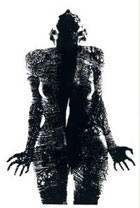
|
Sarah Kane more: acontrolleddetonation |

|
Sarah Kane more: acontrolleddetonation |
| A
Controlled Detonation:
Fragment Four - A Psychic Reading Fragment two is the setting. Three is the crisis. Four is a kind of arcane diagnostic chart that precedes her visit to the doctor in fragment five. The chart’s constellation of values begins at a healthy 100 then zigzags downward to seven, a number laden with mystical meaning. Numerology is beyond the scope of this paper but provocative conjecture might mention the endless struggle between the seven virtues and the seven sins, elements of which are at the core of 4:48. Prudence vs. Foolishness In mystical alchemy, seven is the outermost sphere of human desire, signifying spiritual perfection, or gold, and its celestial body is the sun, the source of light and life. In 4:48 the central voice is searching for lucky seven – by gambling her life in exchange for freedom and the light of truth. The chart may even be pointing toward fragment seven, a vital section of the play containing a critical breathing hole in its center which we will examine in detail.
Fragment Five – Professional Observation Despite the complexity of its nested self-references and narrative linkages, the play moves forward by common steps. In fragment three she threatens suicide. In fragment five she is under observation in some kind of clinic – a logical progression. As in fragment two, the protean voice here sets the scene with expository language. Clear details emerge – coffee, medicine, tobacco, shaved head – from which we can imagine her in some gray observation room with one way mirrors. But for someone on the edge of nervous collapse she retains formidable language skills, exposing the medical establishment with a sharp tongue, as Artaud does in Van Gogh: The Man Suicided by Society: “Psychiatry is no better than a den of apes who are themselves obsessed and persecuted and who possess nothing to mitigate the most appalling states of anguish and human suffocation but a ridiculous terminology.” [21] Here and elsewhere, her anger and word power are antithetical to her emotional powerlessness, and this opposition may help us interpret the crucial line at the center of fragment five, “But I am not here and never have been.” [22] Echoing the inherent self-reflexive dilemma of the play (and all strongly autobiographical literature) she seems to insinuate the divide between the author and the work. Does this “I” represent Kane herself in this instance, behind the scenes so to speak, alluding to the fact that she is not really here in an existential sense, not really the one speaking the line in the theater or on the page, not present with the reader or audience in any way, or is it simply the “I” of the character operating within the synthetic and literary premise of fragment 5; a woman whose flesh is observed by doctors but whose mind and spirit is elsewhere, uncontrollable and free, in fact, trumping those very doctors with her own analysis? The autobiographical complexity of 4:48 constantly forces us to ask to what extent the play is self-reflexive by design or by the influence of external conditions. Nor does she lash out only against her persecutors. In Kane’s plays, victims and oppressors are often interchangeable and fragment five contains a remarkably lucid dispatch from this zone of moral flux. Sensing “evil intent” she imagines “a room of expressionless faces staring blankly…watching me, judging me, smelling the crippling failure oozing from my skin, my desperation clawing and all-consuming panic drenching me as I gape in horror at the world and wonder why everyone is smiling and looking at me with secret knowledge of my aching shame.” [23] Interestingly, her paranoia is directed at one doctor in particular, “the only doctor who ever touched me voluntarily.” [24] With its romantic overtones, she has here the closest opportunity for a love connection with another figure in the play, but the moment is all too brief and snuffed out by her suspicion and fury. In fact, her insults turn aggressive; “I trusted you, I loved you, and it’s not losing you that hurts me, but your bare-faced fucking falsehoods that masquerade as medical notes...you were covering your ass too. Like every other stupid mortal c*nt /to my mind that’s betrayal.” [25] We can never know for sure if her condemnation is justified, ungrateful, or simply paranoid, and we don’t have to know, for she believes it, and it is the beliefs of a broken heart and mind that drive her to suicide. Copyright © 2007 Mustafa Sakarya reproduced on the site with the kind permission of the author |
click for next chapter
www.iainfisher.com / send mail / © 2000-2012 Iain Fisher